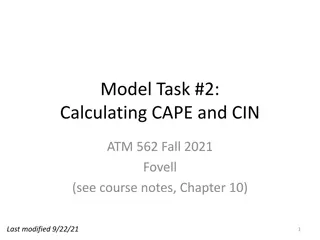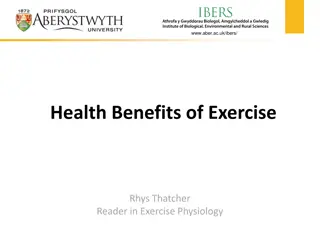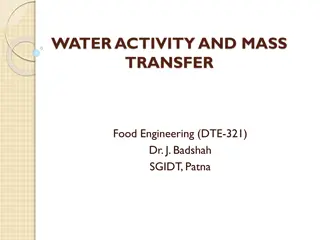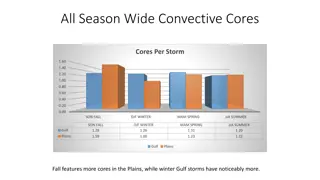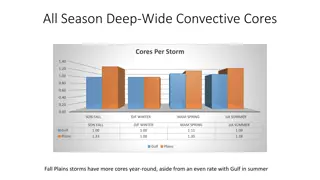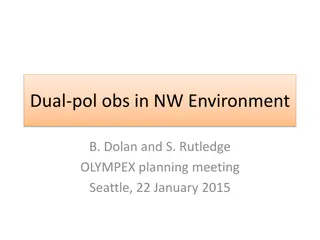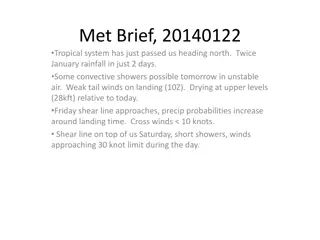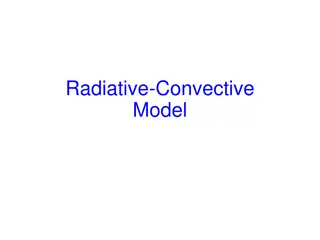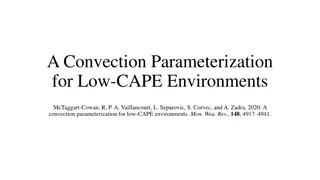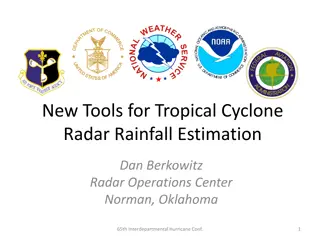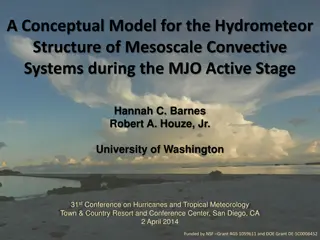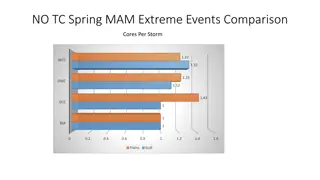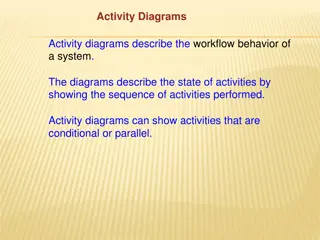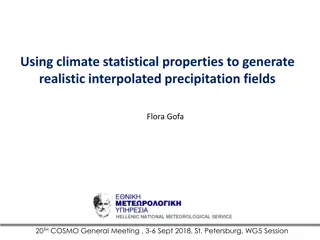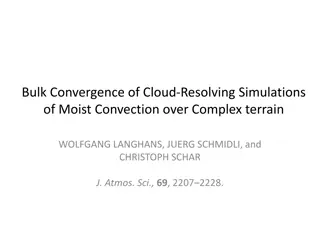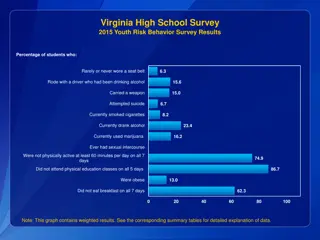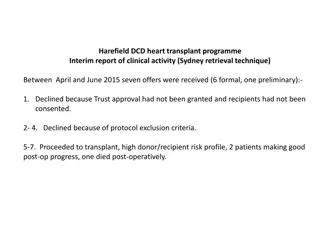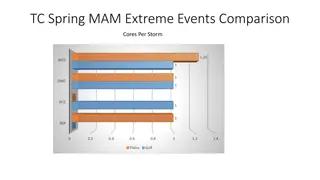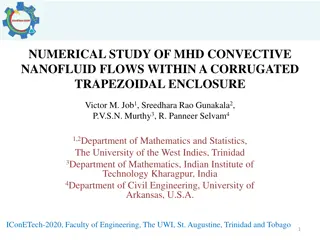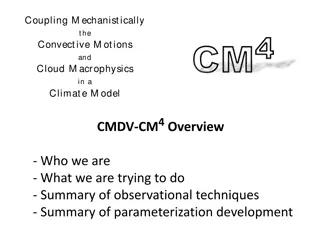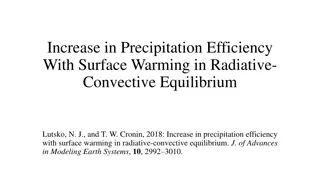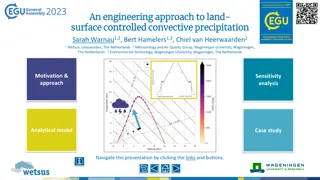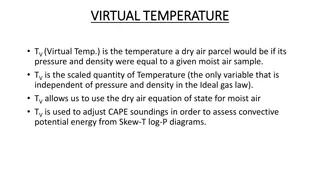Advancements in Solar-Terrestrial Research and Meteorology
The Solar-Terrestrial Centre of Excellence (STCE) focuses on ongoing activities and opportunities in the field of meteorology, with a special emphasis on Antarctica. Their annual meetings cover topics like water vapor feedback mechanisms, extreme weather events forecasting, cloud and precipitation s
0 views • 14 slides
Understanding Half-Life in Physics
Half-life is a key concept in physics, particularly in radioactive decay. It is the time taken for the activity of a radioactive source to decrease to half of its original value. This can be determined experimentally through measuring counts per minute and graphing the data. Additionally, half-life
2 views • 11 slides
Influence of Solar Activity and Orbital Motion on Terrestrial Atmosphere
Solar magnetic field reversal, wavelet spectral analysis, and proxies for solar activity index are discussed in relation to the joint effects of solar activity and solar orbital motion on the Earth's atmosphere. The study highlights the impact of solar cycles on terrestrial climate dynamics and temp
6 views • 16 slides
Modeling and Generation of Realistic Network Activity Using Non-Negative Matrix Factorization
The GHOST project focuses on the challenges of modeling, analyzing, and generating patterns of network activity. By utilizing Non-Negative Matrix Factorization (NMF), realistic network activity patterns can be created and injected into live wireless networks. Understanding and predicting user behavi
4 views • 28 slides
Understanding Activity, Pay, and Special Codes in API Terminology
Dive into the terminology surrounding Activity Codes, Pay Codes, and Special Codes within the realm of APIs. Explore how these codes represent different aspects of scheduling, productivity, and payroll management. Gain insights into the distinctions between Activity Codes and Pay Codes, their implic
5 views • 8 slides
Understanding Precipitation in Meteorology
Precipitation in meteorology is the result of atmospheric water vapor condensing and falling to Earth, a vital element of hydrology. It can occur in liquid or solid forms through processes like evaporation, cooling, condensation, and droplet growth. Different geographic and climate conditions impact
0 views • 17 slides
Understanding CAPE and CIN Calculation in Atmospheric Modeling
Learn how to calculate Convective Available Potential Energy (CAPE) and Convective Inhibition (CIN) using the Weisman-Klemp sounding method. The procedure involves defining parcel properties, lifting the parcel level by level, and performing saturation adjustments. Explore the concepts of positive a
0 views • 14 slides
Exploring the Health Benefits of Exercise and Physical Activity at www.aber.ac.uk/ibers/
Delve into the relationship between physical activity, fitness, and mortality through insightful studies such as the Harvard Alumni Health Study and research by Paffenbarger et al. Discover the impact of exercise on reducing the risk of dying and improving overall health. Explore early work in sport
0 views • 12 slides
Understanding Density of Materials Activity
Density is defined as the mass per unit volume of a material. In this activity, students learn to measure and calculate the density of solid objects or liquids using the density equation. They also explore the concept of density through practical examples and self-assessment tasks. Additionally, the
0 views • 16 slides
Understanding Water Activity and Mass Transfer in Food Engineering
Water activity (aw) plays a crucial role in microbial activity, chemical and physical changes in foods, and the dehydration process. Maintaining water activity below specific levels can prevent microbiological spoilage and deterioration reactions, while also affecting texture, aroma, and overall qua
0 views • 11 slides
Interactive Mystery Chart Activity for Math Classroom
Engage your students with an interactive mystery chart activity to enhance their math skills. Utilize various sets of slides based on your class's needs, including options for distance learning. Use clues to deduce the number of dice in a glass, fostering estimation skills and logical thinking. The
0 views • 19 slides
Gel Electrophoresis DNA Extension Activity in Modern Biology Lab
This lab activity uses agarose gel electrophoresis to determine the length of an unknown DNA fragment by comparing it to known DNA fragment lengths. The process involves gel preparation, loading samples, electrophoresis, staining, de-staining, and measurement of DNA bands. The activity was produced
0 views • 7 slides
Comparison of Convective Cores in Gulf and Plains Regions
A detailed comparison of convective cores between Gulf and Plains regions across different seasons reveals interesting patterns. Gulf storms have more cores in the fall, with larger sizes and more cores in winter. The Plains see more cores in the spring season and have generally bigger storms year-r
1 views • 4 slides
Analysis of Seasonal Variations in Gulf Plains Convective Cores
The analysis reveals fascinating insights into Gulf Plains convective cores, showcasing variations in core numbers, average pixels per storm, pixels per core, and core sizes across different seasons. Deep-Wide cores dominate in the summer, while Gulf cores are larger in the fall. The study sheds lig
1 views • 4 slides
Dual-Pol Observations in NW Environment OLYMPEX Planning Meeting
The OLYMPEX planning meeting in Seattle on January 22, 2015 discussed the contribution of polarimetric S-band radar in rain estimation systems targeted by OLYMPEX. The use of specific differential phase (Kdp) helps in minimizing assumptions about drop size distribution, convective/stratiform distinc
1 views • 15 slides
Understanding Heat-Related Illnesses in Sports Medicine
Hyperthermia is a condition where body temperature is elevated, posing risks like heat stress and heat-related illnesses. Proper knowledge of factors like temperature, humidity, and hydration is crucial for athletes and coaches to prevent such conditions during workouts. Metabolic heat production, c
1 views • 29 slides
Unstable Weather Alert: Tropical System Impact and Shear Line Approaching
Tropical system passing north, bringing heavy rainfall and unstable air. Expect convective showers, tailwinds on landing, and shifting precipitation patterns. Concerns about tropical showers, moisture levels, and shear line impact on landing and takeoff conditions. Images of weather situations provi
1 views • 10 slides
Adherence to 2008 Physical Activity Guidelines & Mortality Study
This study explores the association between adherence to the 2008 Physical Activity Guidelines for Americans and all-cause mortality. It analyzes data from the NHIS and NDI to assess the risks associated with aerobic and muscle-strengthening activities. The primary objective is to evaluate mortality
0 views • 29 slides
Detailed Overview of a Radiative-Convective Model for Weather Prediction
This detailed overview explores the components of a Radiative-Convective Model, covering convection, radiation transfer, cloud-radiation interaction, and surface fluxes. The model incorporates algorithms and parameterizations to simulate various cloud types, radiative transfer processes, and surface
1 views • 9 slides
Convection Parameterization for Low-CAPE Environments
Many global Numerical Weather Prediction systems face challenges predicting convective activity in low-CAPE environments. This study introduces a convection parameterization scheme based on moisture convergence to better represent convective effects. The scheme focuses on the triggering function, up
1 views • 38 slides
Advances in Tropical Cyclone Radar Rainfall Estimation
Reviewing past methods and introducing new tools for radar rainfall estimation in tropical cyclones. Discusses advancements in Dual Polarization rainfall estimation and NSSL's National Mosaic & Multi-Sensor Quantitative Precipitation Estimation. Includes insights on reflectivity-to-rainfall relation
0 views • 28 slides
Conceptual Model for Hydrometeor Structure of Mesoscale Convective Systems during MJO Active Stage
This study presented a conceptual model for characterizing the hydrometeor structure of Mesoscale Convective Systems (MCSs) during the Madden-Julian Oscillation (MJO) active stage. The research focused on the kinematic structure of MCSs and utilized radar data, compositing methodology, and convectiv
1 views • 24 slides
Comparison of Extreme Weather Events in Different Seasons
An analysis of extreme weather events across spring, summer, and autumn, focusing on core aspects per storm, average pixels per storm, and stratiform versus convective distribution. The comparison provides insights into variations in weather patterns and intensity across the seasons.
0 views • 30 slides
Understanding Activity Diagrams and State Chart Diagrams
Activity diagrams describe the workflow behavior of a system by showing the sequence of activities performed, including conditional and parallel activities. Elements such as Initial Activity, Symbol Activity, Decisions, Signals, Concurrent Activities, and Final Activity are depicted in these diagram
0 views • 10 slides
Understanding the Planetary Boundary Layer in Atmospheric Science
The Planetary Boundary Layer (PBL) plays a crucial role in atmospheric dynamics, divided into surface, mixed, stable, and residual layers. During the day, the mixed layer experiences convective motions due to surface heating, while the stable layer dominates during the night. Understanding these lay
0 views • 18 slides
Enhancing Precipitation Interpolation Methods for High-Resolution Data Analysis
Accurate interpolation of precipitation data is crucial for various applications, especially in regions with limited data coverage like Greece. This study focuses on improving the creation of a precipitation atlas for Greece using daily observation analysis. By analyzing the reliability of the metho
0 views • 24 slides
Analysis of Cloud-Resolving Simulations Over Complex Terrain
Examining cloud-resolving simulations of moist convection over complex terrain using large eddy simulation (LES) and deep convective fluxes. The study includes characteristics of the simulations, numerical convergence, and turbulent diffusion. Results reveal insights into the behavior of convective
0 views • 20 slides
The Evolution of Cheerleading: From Yelling to Intense Physical Activity
Cheerleading ranges from yelling to intense physical activity, incorporating tumbling, dance, jumps, cheers, and stunting to motivate sports teams and entertain audiences. Originating in the United States, it has evolved from an all-male activity to a predominantly female sport with some co-ed teams
0 views • 9 slides
Virginia High School Survey 2015 Youth Risk Behavior Results
The Virginia High School Survey 2015 presented data on various risky behaviors among students, including seat belt usage, alcohol and drug consumption, weapon carrying, suicide attempts, physical activity, sexual activity, and more. The results are divided into percentages of students engaging in th
0 views • 4 slides
Interim Report of Harefield DCD Heart Transplant Programme Clinical Activity
The interim report highlights the clinical activity of the Harefield DCD Heart Transplant Programme, showcasing the feasibility of DCD heart transplantation using various methods. The report discusses donor/recipient risk profiles, feedback from medical teams, and the potential impact on national tr
0 views • 7 slides
Understanding Factors Affecting Enzyme Activity in Biochemistry
Enzyme assays measure substrate conversion to product under varying conditions like cofactors, pH, and temperature. Enzyme velocity represents the rate of a catalyzed reaction, typically reported as V0. Enzyme activity is expressed as mol of substrate transformed per minute, with enzyme unit and kat
0 views • 18 slides
Understanding Solid Mixing Mechanisms and Equipment
Solid mixing involves processes like convective, shear, and diffusive mixing which randomize dissimilar particles in a system. Factors affecting solid mixing include particle size, distribution, and properties like density and elasticity. Various mechanisms like tumbling mixers are used for solid mi
0 views • 16 slides
Extreme Weather Events Comparison in Different Seasons
This dataset contains detailed comparisons of extreme weather events in Spring, Summer, and Autumn for different types of convective cores and stratiform regions. The data includes information on average pixels per storm, cores per storm, and stratiform versus convective ratios across the Plains and
0 views • 30 slides
Numerical Study of MHD Convective Nanofluid Flows within Corrugated Trapezoidal Enclosure
Study investigates the influence of sidewall inclination angle and Eckert number on unsteady flow and heat transfer in alumina-water and SWCNT-water nanofluids within a trapezoidal enclosure. Motivation stems from the heat transfer enhancement in trapezoidal geometries compared to rectangular ones,
0 views • 19 slides
Understanding Coupling of Convective Motions and Cloud Macrophysics in Climate Model CMDV-CM4
This project led by Lawrence Berkeley National Laboratory aims to mechanistically couple convective motions and cloud macrophysics in the CMDV-CM4 climate model. Through observational techniques and parameterization development, they seek to evaluate and enhance current cloud representations, develo
0 views • 16 slides
Increase in Precipitation Efficiency with Surface Warming
The study examines how surface warming affects precipitation efficiency in radiative-convective equilibrium. Various factors influencing precipitation efficiency, such as microphysical processes and climate sensitivity, are discussed. Model experiments are conducted to test the sensitivity of precip
0 views • 33 slides
Activity Leader Guidelines for Volunteers
Welcome to the role of a leader, driver, or bus captain! As a leader, it is essential to familiarize yourself with the provided leader packets, understand the details of the activity, and prioritize safety. Taking pride in being a leader, owning the activity before the event, ensuring your packet is
0 views • 25 slides
Understanding Probabilistic Weather Information in Aircraft Safety Recommendations
Subcommittee on Aircraft Safety (SAS) emphasizes the importance of understanding probabilistic weather information for better operational decisions in aviation. Recommendations include leveraging existing knowledge and conducting studies to improve user understanding and decision-making processes re
0 views • 12 slides
Engineering Approach to Enhancing Water Availability in the Mediterranean Basin
Explore an innovative engineering approach to addressing water scarcity in the Mediterranean Basin through regreening degraded areas using sea water evaporation technology. This presentation discusses the impact on convective triggering, surface evaporation, and technology development for sustainabl
0 views • 24 slides
Understanding Virtual Temperature in Meteorology
Virtual temperature (TV) is a crucial concept in meteorology, representing the temperature a dry air parcel would have under specific conditions. It allows for adjustments in convective potential energy assessments and is essential for interpreting Skew-T log-P diagrams. When calculated accurately,
0 views • 4 slides






